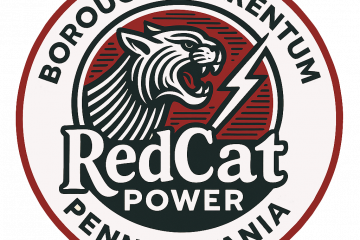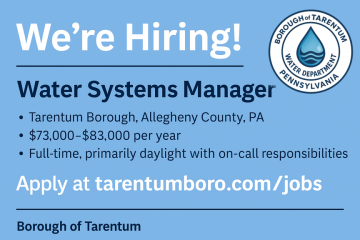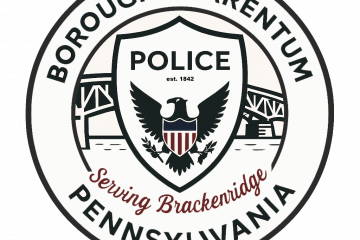We Promised to Keep You Informed — Here’s Where Things Stand
In our previous letter to residents, the Borough explained the TTHMs (Total Trihalomethanes) issue in our water system and committed to keeping the community informed as we work through the challenges. This article serves as an update on our progress, the steps we’re taking right now, and the long-term solutions we are planning to ensure safe, clean, and compliant water for all Tarentum residents.
What Are TTHMs?
TTHMs are chemical byproducts that form when chlorine, used to disinfect drinking water, reacts with natural organic matter. Although chlorine is essential to kill harmful bacteria and viruses, TTHMs can build up to levels that exceed regulatory standards when water sits too long in aging or oversized pipes. Although recent levels have triggered violations, the water remains safe to drink and use.
Why Did We Receive Violations?
The recent violations stem from exceeding the running quarterly average limit for TTHMs. The primary cause is the age and layout of the distribution system, which leads to stagnant water in some sections of the system. Some pipes in Tarentum are nearly a century old, and their size and condition no longer match the Borough’s current population and water usage patterns.
At this time, we anticipate that a third violation remains possible before we receive permit approval from the Pennsylvania Department of Environmental Protection (DEP) to begin some upgrades.
Pending Permit: Moving Potassium Permanganate Treatment
One key step the Borough is working on is relocating the point of potassium permanganate injection from the water plant to the pump house. Potassium permanganate is a treatment chemical used to:
- Oxidize natural organic matter in raw water,
- Improve overall water clarity and quality before disinfection,
- And most importantly, reduce the formation of TTHMs downstream by removing precursors that react with chlorine.
We are currently waiting on DEP approval for a permit to move the injection point. Placing it closer to the source, at the pump house, gives it more time to react with and remove organic material before the water reaches the treatment plant and undergoes chlorination. This upgrade is expected to have a direct and measurable effect on lowering TTHM levels, but it cannot proceed until the permit is granted.
What Are We Doing in the Meantime?
To reduce TTHMs while we await DEP permitting approval, the Borough is implementing immediate measures:
- Installing automatic hydrant flushers at dead-end streets will help keep water moving through the system and prevent stagnation.
- Continuing operational changes to promote flow and better disinfectant contact time.
- Restructuring the water system (more below)
These steps are short-term solutions to manage risk while we pursue long-term system upgrades.
Long-Term Solution: Replacing Aging Pipes
The root cause of the problem is the age and condition of the water distribution system. Many of Tarentum’s water lines were installed in the early 1900s and no longer meet modern size, flow, or material standards.
- We estimate that fully modernizing the system will cost between $20 million and $40 million.
- This will be one of the largest infrastructure investments in Borough history, requiring state and federal grants, low-interest loans, and multi-year capital planning.
Replacing these lines is essential to fix the TTHM issue, ensure reliable service, reduce water loss, and position the Borough for future growth and development.
Restructuring the Water System
Beyond physical infrastructure, the Borough is restructuring its water system operations to better align with modern compliance and operational needs. We are integrating water distribution and the water treatment plant into a unified system under one management structure.
Why this matters:
- Better coordination between the plant and distribution staff ensures consistent water quality from source to tap.
- Faster response to issues like TTHM exceedances or flow problems.
- Improved alignment with DEP regulatory expectations, including oversight, recordkeeping, and operational consistency.
- A more resilient and redundant staffing model, reducing reliance on any single individual or department and improving continuity during emergencies or staff turnover.
This change will help ensure the system is run holistically, not in isolated parts, which is essential for meeting regulatory standards and delivering reliable service to our residents.
Our Commitment to You
We understand that TTHM violations can cause concern. We want to reassure you that:
- We are being transparent about the challenges and the work ahead.
- We are actively working with DEP to ensure compliance and safety.
- We are investing in the future of our water system to ensure that every resident has access to safe, reliable water.
You can find the Borough’s Water Consumer Confidence Reports on this page: Water Department – Tarentum Borough
Additionally, the page has information on the system, as well as the most recent DEP asset plan.


